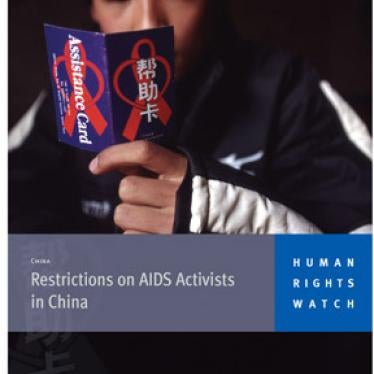(Hong Kong) - The Chinese government should stop its harassment of AIDS activists and remove restrictions on civil society groups working to fight the country's burgeoning HIV/AIDS epidemic, Human Rights Watch said in a 57-page report released today.
Based on on-the-ground interviews with Chinese AIDS activists, gay rights activists, activists working with drug users, and website managers, the report, "Restrictions on AIDS Activists in China," shows that while senior officials have said they want to encourage China's emerging civil society, many AIDS activists face state harassment and bureaucratic restrictions. First-hand accounts provided to Human Rights Watch reveal that activists conducting AIDS information workshops or working with those at high risk of HIV have been harassed or detained, and that pornography laws are used to censor websites providing AIDS information to gay men and lesbians under pornography laws.
"Grass-roots organizations have direct experience that could greatly strengthen the country's fight against AIDS," said Sara (Meg) Davis, China researcher for Human Rights Watch. "But in a number of regions, they face harassment, censorship and even beatings because the Chinese government is suspicious of any activity outside its direct control."
China faces what could be one of the largest HIV/AIDS epidemics in the world, with Chinese and international experts predicting that over 10 million Chinese may be infected with the human immune deficiency virus by 2010.
Human Rights Watch said that after trying to hide the extent of the problem for years, in the wake of the SARS epidemic, senior Chinese officials began to confront the AIDS epidemic. In 2004, China's premier Wen Jiabao called fighting AIDS China's top priority. China has also established an ambitious nationwide treatment and care program, officially called simian yiguan -- "Four Free and One Care."
Despite official promises, AIDS workers and activists told Human Rights Watch that national policies on AIDS are unevenly implemented. Many entrenched local officials who may have a limited understanding of AIDS and how it is transmitted fear any public discussion of the disease as a source of embarrassment that threatens external investment in their impoverished regions.
"AIDS activists are at the forefront of China's emerging civil society," Davis said. "The Chinese government should do all it can to support the work of groups who have helped thousands of people infected with HIV."
The problems facing AIDS activists are most visible in Henan province, one of the epicenters of the epidemic. Thousands of people, perhaps a million or more, were infected with HIV as a result of a profit-driven blood-selling scheme run by provincial officials throughout the 1990s. None of the officials who profited from the scheme and ran the blood centers have been held accountable, and some have even been promoted. Doctors and activists in Henan estimate there are some 100,000 children orphaned by AIDS in that province alone.
For years, Henan officials attempted to cover up the epidemic. Over the past few years, Henan provincial and county officials have publicly promised medical aid and financial support to impoverished villages ravaged by the AIDS epidemic. But in practice Henan's response continues to be uneven. Residents and activists complained to Human Rights Watch about the lack of adequate services and care, especially for children affected by AIDS, and about alleged corruption in the administration of internationally and nationally-funded aid programs.
Instead of addressing these criticisms, Henan officials have detained those activists who complained too loudly or who took matters into their own hands by initiating grass-roots initiatives to fill the gaps left by the state. Dozens of activists have been jailed, and some have even been beaten by thugs hired by local officials. Activists working in other inland provinces have reported similar problems.
"We continue to receive the greatest number of complaints from Henan, but that's because AIDS activists there are better organized and able to get their complaints before the national and international media," Davis said. "We are concerned that in other, more repressive provinces, conditions may be similar or worse."
Human Rights Watch said that activists also face problems in establishing their organizations in the first place. Around the country, activists who try to register new NGOs face a web of bureaucratic restrictions designed to keep government control over grass-roots organizations. Many can only register as for-profit enterprises, making them ineligible for many sources of funding.
In addition, China's notorious restrictions on the Internet have hampered the delivery of urgently-needed AIDS information to high-risk groups, such as men who have sex with men. Under a national anti-obscenity campaign run by the police, hundreds of websites have been shut down, including a number that provided vital AIDS information and counseling to lesbians and gay men.
"China's laws on pornography say that any website with homosexual content is automatically considered to be obscene," Davis said. "That's not only discriminatory; in the context of the AIDS epidemic, it is self-destructive."
Human rights watch said that after the report was printed, the organization met for the first time with officials at the Chinese Ministry of Health to discuss aids and human rights in China. Davis called the discussion "frank and productive."






